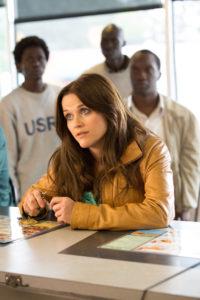Incredible in scope and rife with inherent drama, it is little surprise that Hollywood sought to make a film based on lives of the estimated 20,000 boys and girls who fled Sudan during the Second Sudanese Civil War during the early 2000s.
The Lost Boys of Sudan’s journey encompassed thousands of miles and thousands of dangers — enduring disease, escaping wild animal attacks and evading forced recruitment into the Sudanese People’s Liberation Army.
While The Good Lie, a 2014 drama starring Reese Witherspoon that was based on their story, didn’t have much box office success, it is becoming grounds for an intriguing legal battle swirling around authorship and rights.
According to The Hollywood Reporter, U.S. District Judge Leigh Martin May will allow The Lost Boys to continue their copyright and fraud claims lawsuit, originally filed in February 2015. Fifty-four of the displaced Sudanese people living in Atlanta filed lawsuits against Ron Howard’s Imagine Entertainment and other producers on the film for breaching their initial contract terms for compensation and joint authorship.
The plaintiffs state in the lawsuit that they, “partnered with Defendants to create The Good Lie’s script, in part, based upon their promise that a non-profit foundation organized and run by the refugees would be the sole beneficiary of any fundraising efforts associated with The Good Lie. However, neither the refugees nor their Foundation have been compensated in any fashion for sharing their traumatic personal stories and assisting with the creation of the script for The Good Lie.”
According to the lawsuit, the Lost Boys met with film producer Bobby Newmyer and screenwriter Margaret Nagle in 2003 to conduct recorded interviews to provide facts, background, and stories for the eventual screenplay. In her decision, U.S District Judge Leigh Martin May ruled that the Lost Boys have enough facts to support findings of copyright infringement and a possible future injunction.
“The Interviews, however, did not consist merely of ‘ideas, facts and opinion made during a conversation,’ like the interviews by journalists in the cases Defendants cite,” Judge May states. “Rather, the Interviews were a creative process designed to create material for a screenplay and film. All that an ‘original work’ must possess is ‘some minimal degree of creativity’ … even a slight amount will suffice. Plaintiffs’ telling of their personal stories in response to questions designed to elicit material to create a fictional script for a feature film likely includes enough creativity to render the Interviews an original work of authorship.”
Judge May concludes, “Plaintiffs have stated a cognizable claim for protection against continuing infringement by Defendants that, if proven, warrants entry of a permanent injunction.”
It’s not an uncommon practice in “based on true events” movies for screenwriters to conduct interviews to mine facts and incorporate them into the screenplay. It’s also not uncommon for writers to move things around, create composite characters and other events, which is why the term “based on true events” exists. When these types of films come out, there’s always the question of how much is true, what role the subject plays and how much input they have in the story.
If The Lost Boys of Sudan get a favorable verdict, this changes the game on how contributions from the subject influence authorship and original work on “fact-based” films.



